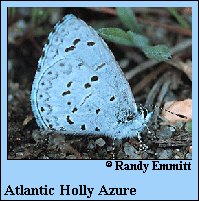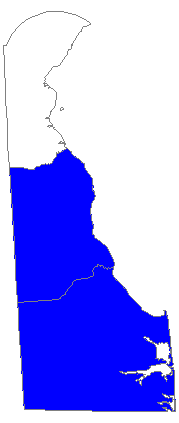 |
 

 |



Atlantic Holly Azure (Celastrina idella Wright and Pavulaan)
Wing span: 1 1/4 - 1 1/2 inches (3.2 - 3.9 cm).
Identification: Upperside of male all pale blue, sometimes with white scaling on hindwing. Female blue with small black area on forewing tip. Underside of hindwing pale gray with pale dark gray markings.
Life history: Caterpillars eat flowers.
Flight: One flight from late February to early June, early in south of range, later in north. Usually flies after spring flight of Spring Azure.
Caterpillar hosts: Hollies (Ilex species).
Adult food: Flower nectar.
Habitat: Rich, deciduous woods, especially near streams and acid bogs.
Range: Atlantic coastal plains from central New Jersey south to South Carolina.
Conservation: Not reported.
The Nature Conservancy Global Rank: G4 - Apparently secure globally, though it might be quite rare in parts of its range, especially at the periphery.
Management needs: Survey habitats and protect them from alteration and exotic plants.
References:
Celastrina idella (Lycaenidae: Polyommatinae): a new butterfly species from the
Atlantic coastal plain. The Taxonomic Report 1(9):1-11.
Author: Paul A. Opler
State and Regional References:
Glassberg, J. 1993. Butterflies Through Binoculars: A Field Guide to
Butterflies in the Boston-New York-Washington Region. Oxford Univ. Press,
New York, N.Y. 160 pp.
Opler, P.A. 1998. A field guide to eastern butterflies, revised format.
Houghton Mifflin Co., Boston.
Shapiro, A.M. 1966. Butterflies of the Delaware Valley. American Entomological
Society Special Publication. Philadelphia, PA. 79 pp.
Woodbury, E.N. 1994. Butterflies of Delmarva. Delaware Nature Society, Inc.,
Tidewater Publishers, Centreville, MD. 138 pp. [NOTE: this book only
treats True Butterflies (Papilionoidea). It does not treat Skippers
(Hesperioidea).]

